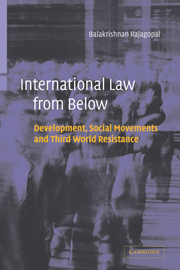Book contents
- Frontmatter
- Contents
- Abbreviations
- Preface and Acknowledgments
- Introduction
- PART I International law, development, and Third World resistance
- PART II International law, Third World resistance, and the institutionalization of development: the invention of the apparatus
- 3 Laying the groundwork: the Mandate system
- 4 Radicalizing institutions and/or institutionalizing radicalism? UNCTAD and the NIEO debate
- 5 From resistance to renewal: Bretton Woods institutions and the emergence of the “new” development agenda
- 6 Completing a full circle: democracy and the discontent of development
- PART III Decolonizing resistance: human rights and the challenge of social movements
- PART IV Epilogue
- References
- Index
5 - From resistance to renewal: Bretton Woods institutions and the emergence of the “new” development agenda
from PART II - International law, Third World resistance, and the institutionalization of development: the invention of the apparatus
Published online by Cambridge University Press: 09 July 2009
- Frontmatter
- Contents
- Abbreviations
- Preface and Acknowledgments
- Introduction
- PART I International law, development, and Third World resistance
- PART II International law, Third World resistance, and the institutionalization of development: the invention of the apparatus
- 3 Laying the groundwork: the Mandate system
- 4 Radicalizing institutions and/or institutionalizing radicalism? UNCTAD and the NIEO debate
- 5 From resistance to renewal: Bretton Woods institutions and the emergence of the “new” development agenda
- 6 Completing a full circle: democracy and the discontent of development
- PART III Decolonizing resistance: human rights and the challenge of social movements
- PART IV Epilogue
- References
- Index
Summary
International lawyers who focus upon international economic law as well as international institutions readily concede the importance of the BWIs to the success of their respective disciplines. While the GATT/WTO mechanisms constitute an important segment of the institutional framework of international economic law, the BWIs are better known and have historically wielded much more influence over the economic and financial policies of Third World countries. In particular, due to their enormous resources, considerable intellectual power, and the resultant influence they have over the national policies of developing countries, they are also more “sexy” and constitute favorite targets of media and academic critiques. Indeed, for many Third World states, their historical relationships to the BWIs have been not only more significant, but also more problematic than their relationships with other organizations. This is partly due to the role of these institutions as gate-keepers to the international economic system, including access to western capital. It is also due to the far-reaching power of these institutions that extends into most domains of human activity in the Third World, including economic and social policy, urban and rural development, and even the very structure of the state. Furthermore, due to their focus on issues of justice – mainly anti-poverty programs – the BWIs figure inevitably in radical Third World critiques of the international economic order.
Yet, it is not automatically obvious why or how these institutions became so important and powerful.
- Type
- Chapter
- Information
- International Law from BelowDevelopment, Social Movements and Third World Resistance, pp. 95 - 134Publisher: Cambridge University PressPrint publication year: 2003



